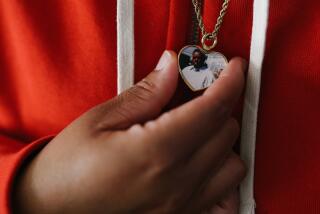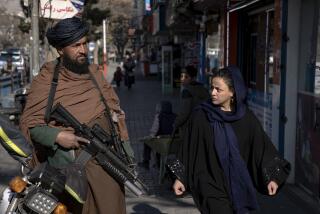Pakistani’s Sentence Matches Crime
- Share via
ISLAMABAD, Pakistan — One of history’s most prolific killers will be executed in the same grisly way he dispatched his young victims: strangled with an iron chain, hacked into 100 pieces and dissolved in a vat of acid.
So decreed Judge Allah Baksh Ranja on Thursday, when he sentenced 42-year-old Javed Iqbal to death following his conviction for the rape, murder and obliteration of 100 boys and young men.
The judge also sentenced Iqbal to 700 years in prison--seven years for each body he confessed to dissolving in acid. The judge said Iqbal should be choked to death for each of those he killed.
Although little physical evidence tied Iqbal to the crimes, he told police that he had chopped up most of his victims, dunked them in acid and poured the remains into the gutters of the central Pakistani city of Lahore.
“Iqbal should be strangulated through iron chain . . . in the presence of the legal heirs of the deceased,” Ranja said in his order. “His body should be cut into 100 pieces and same should be put into a drum containing the acid according to modus operandi adopted by the accused.”
The sentencing follows months of horror and melodrama in a case that could end in the same macabre fashion as it began. Iqbal’s spectacular confessions brought parents from around Lahore searching for their missing children.
Iqbal and three other defendants, who were convicted as accomplices, smiled as the verdict was announced.
“Your honor, I am innocent,” Iqbal declared after the judge handed down the sentence.
As he was being led out of court, Iqbal told a crowd that had gathered around him that he didn’t kill anyone. His lawyer, Najeeb Faisal, promised to appeal.
For all of Thursday’s courtroom drama, the death sentence may never be carried out--or at least not in the way the judge ordered.
Pakistani Interior Minister Moinuddin Haider said Thursday that the federal government will challenge the sentence.
“This kind of punishment is not permitted,” Haider said. “We are signatories to the human rights convention, which does not permit this.”
The International Covenant on Civil and Political Rights states that “no one shall be subjected to torture or to cruel, inhuman or degrading treatment or punishment.”
The sentence comes on the eve of a scheduled visit by President Clinton, who is set to stop in Islamabad, the capital of Pakistan, during a tour of South Asia next week. In its annual report on human rights last year, the U.S. government chided the country for numerous violations.
Pakistan periodically executes convicted murderers, but death is usually by hanging, and the penalty is carried out inside jails. Pakistan’s neighbor to the north, Afghanistan, is notorious for its public executions, which are often carried out before large crowds by the family of the victim.
“This is unheard of. It is barbaric and arouses the fascistic instincts in a society,” said Asma Jehangir, a human rights investigator for the United Nations.
Iqbal’s lurid crimes first became public last year, when he sent the police a letter saying he had strangled 100 boys, hacked up their bodies and dissolved them in vats of acid. Iqbal’s letter led police to his house in Lahore, where authorities found piles of children’s clothing and photos of the 100 children whom Iqbal had confessed to killing.
Parents of missing children were able to identify most of the photos and clothing, although police collected little forensic evidence. Throughout the trial, parents of the victims, many of whom were street children, gathered outside the courtroom, and many called for his death.
In his letter, Iqbal said he had killed the children in retaliation for abuse he suffered at the hands of family servants and the police, who, he said, had ignored his requests for help.
Pakistani authorities launched a massive search for Iqbal but failed to find him. Then, on Dec. 30, Iqbal walked into the Lahore office of Jang, a popular Pakistani newspaper, and announced that he was the killer.
“I am Javed Iqbal, killer of 100 children,” he told staff members at the daily. “I hate this world, I am not ashamed of my action, and I am ready to die.”
But soon after that, Iqbal recanted the confession, claiming he had concocted the story. During his trial, Iqbal testified that he intended his confession and letter as warnings for the parents of missing children. Some of the victims had been missing more than six months before their parents reported their disappearances to police.
Three accomplices, including a 13-year-old boy, also were found guilty. The boy and one accomplice were given prison terms, and the third accomplice was sentenced to death.
More to Read
Sign up for Essential California
The most important California stories and recommendations in your inbox every morning.
You may occasionally receive promotional content from the Los Angeles Times.













